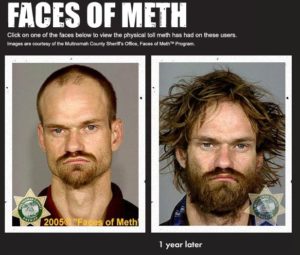Some of the tell-tale signs of meth abuse include meth sores, scabs, and acne on the face. Meth causes many users to feel a crawling sensation under their skin (called “formication”), often referred to as “meth mites”, causing them to pick obsessively at their faces, leading to meth scars. Heavy meth usage cuts off the supply of blood to all parts of the body, which destroys blood vessels. This leads to meth’s effects on the body including acne, sores, and scabs that can dramatically alter a meth user’s appearance.
Chronic meth abuse suppresses the immune system, leading to slower healing of acne, meth sores, and meth scabs, plus the skin loses its luster and elasticity as a result of decreased blood flow. A heavy meth addict users often looks years or even decades older than their actual age. These effects are intense and can happen quickly. This is why it’s best recommended to seek the support of a rehabilitation center in order to successfully beat meth abuse or addiction.
How exactly does methamphetamine cause these effects?
Methamphetamine use can have a devastating effect on a user’s skin, causing all types of sores. Sores from chronic meth use are often caused by a suppressed immune system, but may also be a result of:
- The pipe: The pipe that an addict uses to smoke is often too hot and burns the mouth, resulting in mouth sores.
- Sweat: Face sores occur when an addict begins sweating. They are sweating out the toxins from the drugs which form as pimples. They turn into open sores once the user begins to pick at them.
- Poor blood supply: Methamphetamine use damages the blood vessels This usually dries out the skin, forming sores.
Once a user reaches formication, they will begin to feel a crawling sensation under the skin, also known as meth mites. This causes the meth addict to pick at all the sores on their face, only making the problem worse and resulting in scarring.
In one of the most circulated and shocking slide shows ever distributed, the Multnomah County Sheriff compiled a series of mug shots showing the before and after pictures of meth users that all appear to have meth sores. The photos are testaments to how dramatically chronic meth abuse can affect the appearance of users in as little as three months and were intended to create a realistic presentation of the effects that drug use can have on the body as a way to educate young people in particular.

he physical effects of a meth addiction aren’t limited to skin problems on the face and body – another devastating effect is “meth mouth,” tooth decay that happens as a result of meth use. The drug causes dry mouth and reduced saliva, which doesn’t allow the mouth to neutralize acids. The acids then eat away at the teeth and gums, causing major dental problems. Meth abusers often have cravings for highly sweet foods like candy and sugary drinks, exacerbating the problem of tooth decay. It is also thought that the corrosive effect of the chemicals in meth may cause wearing away of the tooth enamel.
The American Dental Association reported that the teeth of people addicted to meth are characterized by being blackened, stained, rotting, crumbling and falling apart. Often, the teeth can’t be salvaged and must be removed. The study also found that the more meth a person used, the worse their tooth decay was. This is likely caused by a combination of dry mouth and long periods of poor oral hygiene.
Ultimately, meth is a potent, dangerous drug that can have irreversible effects on both the appearance and brains of users. The harmful effects of meth are long-lasting and can scar a patient for life. In addition to these long-lasting effects, meth abusers are also at increased risk of diseases such as hepatitis B and C, and HIV. This is because users that inject meth often share needles. The National Institute on Drug Abuse also reports that meth may speed up the progression of HIV/AIDS and worsen symptoms of the disease.
The professional clinical staff at Northbound Treatment are highly-trained at helping individuals quit meth and start down a path of long-term sobriety.
If you or someone you know suffers from methamphetamine abuse, we’re here to help. We offer specialized addiction treatment services for those who may be struggling with a meth addiction. It’s important for individuals to seek help for this addiction, as the withdrawal symptoms are hard to overcome.
Our drug rehab program includes medical detox, counseling, meetings, and peer support to support you through all phases of recovery. At Northbound Treatment, each patient’s treatment plan is unique so that they can make personal changes that will change their life for the better.
For more information about our chemical dependency services, contact us or call us at (866) 311-0003.
Author
-

President, CEO & Founder at Northbound Treatment Network
Paul Alexander is the CEO, President & Founder of Northbound Treatment Network in Newport Beach, California. He believes wholeheartedly in transformational leadership, organizational health and effective, fully integrated substance use disorder and mental health treatment. With over 27 years of experience in behavioral healthcare, Paul has extensive knowledge of “in vivo” treatment modalities, clinical development, operations, strategy, marketing and financial planning. He has been widely recognized for his development of collegiate-based residential treatment programs for students in recovery and authored a research study at The University of California confirming this modality’s effectiveness.
Paul’s comprehensive professional experience, willingness to innovate, and emphasis on organizational health are vital factors in Northbound’s continued success. Paul received his Certified Addiction Treatment Specialist training at Saddleback College in Mission Viejo, CA, and was awarded Outstanding Alumni Service Award in 2002. Paul holds a Bachelor of Arts degree in Criminology, Law and Society, Summa Cum Laude, from University of California, Irvine, and a Juris Doctorate degree from Loyola Law School of Los Angeles. Paul currently serves on The National Association of Addiction Treatment Providers (NAATP) board. In addition, he serves on The Family Recovery Foundation board and The CarePossible board in Orange County; both organizations are committed to raising funds for family recovery and treatment for former military personnel. Paul is in recovery himself and lives in Orange County with his wife Silvana and his two young sons, Noah and Dean.







